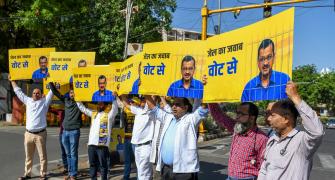Despite finance minister’s assurance, tax officials seem reluctant to take steps for tackling issues at stake Recently 20 chief executives of companies were asked if tax terrorism had decreased. Seventy-five per cent said it has not. This has brought to focus an issue of great importance.
Recently 20 chief executives of companies were asked if tax terrorism had decreased. Seventy-five per cent said it has not. This has brought to focus an issue of great importance.
Tax terrorism was an election issue one year back and after this new government came to power there was a lot of flamboyance about declaring that this menace will be eradicated. In fact, the finance minister said at the HT Leadership Summit (reported in BS on November 22, 2014, “Unsustainable tax demand will not get taxes but only earn bad name”.
This was a transparent and clear statement which would have gone a long way to remove tax terrorism if this was incorporated into a circular by the CBDT or CBEC. Officers in the field do not go by statements made by the finance minister, or even a Budget speech. They follow circulars by the Board.
I even wrote to the finance minister to get such a circular issued. Not only that no such circular has been issued but the existing circular number 967/01/2013-CX dated January 1, 2013, which tightened the recovery norm in a patently unfair and ham-handed manner and thus unleashed tax terrorism to a greater degree, still stands tall. So, the change which should have taken place after the FM’s speech has not taken place.
By tax terrorism, we mean putting illegal or extra legal pressure on the taxpayers to extract duty or deny refund which is not due or due only after following due process of law. Many examples of tax terrorism are there. Most common is to deny all refunds or pass adverse adjudication orders in the name of realising target of revenue.
Another atrocious method is to file an appeal against tribunal’s order in the high court even where the issue is one of classification or valuation for which, according to section 35G and L of Excise Act, the appeal lies in Supreme Court. Calcutta High Court in the case of CC vs Impex, 2014(305) ELT 38 Cal, has reiterated that appeal lies with Supreme Court.
Once it goes to high court, it will take several years for the case to come up when the high court will say that the case is for Supreme Court to decide. In the meantime, the department will go on raising demands on the party every month and never finalise the case and pressurise the party to pay. This is a classic example of tax terrorism. Remedy lies in the finance minister making it clear to CBEC and CBDT that they must implement his statement of intent. He has to take some personal interest in monitoring the progress on this issue on the following lines.
(a) The circular mentioned above should be withdrawn.
(b) An anti-tax-terrorism directorate should be created which should work directly under the chairman of board. Wide publicity should be given to it.
(c) Ombudsman should be specifically authorised to entertain cases of alleged tax terrorism. Now it is not.
(d) FM should enquire from the 15 CEOs of the Business Standard survey who said that tax terrorism is still continuing on the specific nature of their complaint.
(e) Law of unjust enrichment should be abolished as it is a convenient tool to deny refund and thus send the tax payers to desperation.
(f) Advance Authority for Ruling should be authorised to give ruling even if manufacture has started or import has taken place, if show cause memo has not been issued.
(g) Fixing revenue target for commissioners must stop.
(h) Board should be made to have some respect for tribunal’s order. Every order of tribunal favourable to the assessee should not be challenged. The percentage of victory in appeal is abysmally dismal.
(i) Those commissioners, who filed appeal in high court rather than in Supreme Court, should be reprimanded and sent to training school for fresh training with probationers.
Panel lawyers who file such cases should be dismissed from the panel.
(j) The CBEC has not issued a single statutory ruling between 2007 and 2013 under section 37B of Excise Act and section 151A of Customs Act. It is clear case of abdication of responsibility. Rulings could have greatly solved ticklish issues.








